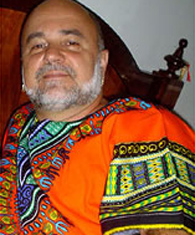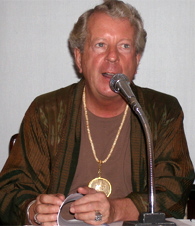Brazil gave no advance warning. Late in the annual sessions of the United Nations Commission on Human Rights in April, 2003, it introduced a simple motion that said that gays and lesbians were entitled to human rights, just like other people.

Pioneer Brazilian gay activist Luiz Mott.
Past fights at the UN involved adding the magic words "sexual orientation" or "homosexuals" to lists. Do we get on the list of groups that should not be discriminated against? No (UN World Conference on Human Rights, Vienna, 1993). No, again (UN Fourth World Conference on Women, Beijing, 1995). Do we get on the list of groups vulnerable to HIV infection? No (UN Sub-Commission, 1995). Should a general study on discrimination include some talk about sexual orientation? No (some members of the Sub-Commission, 2004).
Why did Brazil do it? And why did the Netherlands not do it?
Under former President Fernando Henrique Cardoso, Brazil was proactive on sexual orientation issues. Pioneer gay activist Luiz Mott was honoured by the President. The country mounted its "Brazil Without Homophobia" campaign, to educate police and teach tolerance in the schools. At Durban, South Africa, during the World Conference on Racism, Xenophobia and Related Forms of Intolerance, Brazil worked hard to get references to sexual orientation in the final conference statement as another form of intolerance. The attempt failed. But Brazil tried.
The Netherlands has long been on our side. It even included representatives of Dutch COC (Center for Culture and Leisure), the first post-war gay rights organisation in the world, in their delegations to the General Assembly. But that was never announced. No one knew. No rainbow flags.
The Dutch delegation once criticised the US for its ban on homosexuals entering the country. The Syrian delegation congratulated the Dutch for being so bold as to take on the US. But, next time, could it please be on some issue they could support - please?
The Germans were the most blunt about not playing a lead role at the UN on GLBT equality. If a Western country moved the Brazilian resolution, it would be the "kiss of death," Germany said in 2005. It would support the arguments that homosexuality is western - and distant from cultures and traditions in Asia and Africa. Brazil's sponsorship deflected that argument.
One hundred amendments
So what happened to the Brazilian resolution in 2003?
Step one. On behalf of the Organization of the Islamic Conference, Pakistan moved a "no action" motion, designed to kill the Brazilian resolution without any debate. That motion was defeated, 24 to 22.
Step two. Amendments were proposed by Saudi Arabia, Pakistan, Egypt, Libya and Malaysia affecting all paragraphs of the draft resolution, with the intention, according to observers, of killing the initiative. Pakistan threatened to move a hundred more amendments. An undemocratic filibuster had been mounted to block any final vote.
These actions took place on the last days of the Commission session. The resolution and amendments were put over to the next annual session by a vote of 24 to 17, with 12 abstentions.
Twenty-six countries had signed up as co-sponsors of the resolution, including many who were not members of the Commission that year. That was new. Brazil had forced them to say yes or no. The US said it would abstain.
Fruits in Suits and Dykes in Dresses
Open gays and lesbians had been as rare as hen's teeth at the regular sessions of United Nation bodies. I spoke in 1992, provoking "open hostility" on the part of some members of the Sub-Commission.
A bunch of us spoke in 1993 at the Vienna World Conference on Human Rights. Lots of our sisters were at the Beijing Women's conference in 1995. The World conferences welcomed lots of NGOs (non-governmental organisations). But the annual meetings of the Commission and the Sub-Commission - they were a different story.
What the Brazilian resolution did was to force us to learn how to lobby at the UN. Organise may be too strong a term. Yes, it is like herding cats. But there we were in 2004 - dresses, jackets, ties - eager to see the Brazilian resolution triumph - around 50 people from all five official UN regions.
No gay or lesbian organisations are accredited at the UN, but we had friends in recognised NGOs who gave us entry. Key GLBTs started learning the peculiar culture of the UN Commission on Human Rights. And we were back in larger numbers in 2005 for the next installment of the story.
I stayed home in Bangkok, convinced that the Brazilian resolution would go nowhere. I was right and I was wrong.
Deferment, demise and a kiwi consolation prize
In advance of the 2004 Commission session, Pakistan, as coordinator of human rights and humanitarian issues for the Organization of the Islamic Conference, circulated a letter to other OIC missions in Geneva:

On 6 August 1992, Professor Douglas Sanders (above) became the first gay man to speak openly in any United Nations human rights body.
Brazil issued a statement during the 2004 session of the Commission on Human Rights that the time was not right to proceed with the resolution. More time would be required to seek a consensus. The resolution was quietly put off to 2005.
In advance of the 2005 session Brazil made it clear that it would not reintroduce the resolution. Would someone else take the lead - maybe Argentina? No one came forward.
Brazil said that Europe should have done more to support the resolution. Western states said Brazil had done little to rally other developing states. South Africa thought Brazil had been put up to moving the resolution by Europe. Nobody was happy.
There was a consolation prize. Western states now had anti-discrimination laws and civil union systems back home. How could they remain silent in Geneva? New Zealand took the initiative, with a pro-gay statement on behalf of 37 governments:
�we recognise that sexuality is a sensitive and complex issue. But we are not prepared to compromise on the principle that all people are equal in dignity, rights and freedoms. � We hope this Commission will not be silent for too much longer.
Good reasons to do nothing
Everybody had good reasons for killing the Brazilian resolution. For the passionate opponents it was the defense of Islam - or tradition - or the family. What of the supporters - our friends - who let it die?
First Brazil. The resolution introduced in 2003 linked back to initiatives of the Cardoso presidency. Luis Inacio Lula da Silva of the Workers Party - universally known as Lula - became president early that year. That seemed good for GLBT rights. A prominent Workers Party politician had pushed for partnership rights for a decade. The big cities all had anti-discrimination laws that included "sexual orientation."
Lula had other priorities. He courted Arab states for investment, hosting an Arab-South American conclave in Brazil in April, 2005. Gossip says that Egypt directly asked Brazil to drop the sexual orientation resolution. Brazil assumed a leadership role among developing states at the World Trade Organization, blasting the US and the EU for their agricultural subsidies. Few votes for GLBT equality among those allies.
Lula also an annoying politician at home, Severino Cavalcanti, who in February defeated a government candidate to become president of the Congress' lower house. He hates homosexuals.
All pragmatic reasons to drop the GLBT initiative.
And South Africa - the first country in the world to prohibit sexual orientation discrimination in its constitution. South Africa was protecting its role as a leader of the African group, giving priority to development goals.
Activists were enthusiastic when Sweden agreed to include a reference to "gender identity" in its draft resolution on extra-judicial executions. The killings of transvestites in Rio and other large cities, made the reference highly appropriate. Canada included "sexual orientation" in its draft resolution on violence against women.
But both Sweden and Canada wanted to protect their resolutions from controversy - and some states resented the inevitable discussions of honor killings the resolutions would bring. Canada and Sweden dropped the references.
Germany would not sponsor the resolution because that would confirm that the resolution reflected 'western' values.
Everybody had good reasons.
What next?
We are probably at the UN to stay. Lead activist John Fisher says the "era of invisibility" at the UN is over. So we will be at the Commission in 2006 - and 2007 - and 2008 - even if Geneva is exceedingly boring and an outrageously expensive city.
The UN High Commissioner for Human Rights has suggested that we try to organise an international forum to discuss these issues - with participation by our critics. Her office would be involved - but would not be the lead sponsor. That will probably happen, though it is hard to get our critics to join any dialogue. Once they won at the Commission, they simply condemned campaigns for "new rights," not uttering the distasteful words "homosexual" or "sexual orientation." They do not want dialogue. We have to drag them kicking and protesting to the table.
So there are some fights, some lobbying, some campaigns ahead. OK. We are used to lobbying, marching, flying flags. That's part of our lives. Thanks to Brazil our campaigns have begun in the stately halls of the Palais des Nations overlooking Lake Geneva. Too bad the meetings aren't in Rio. That would be more fun.
Douglas Sanders is a retired Canadian law professor living in Bangkok. He can be contacted at sanders_gw@yahoo.ca.












 打印版本
打印版本










读者回应
抢先发表第一个回应吧!
请先登入再使用此功能。